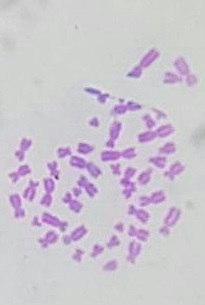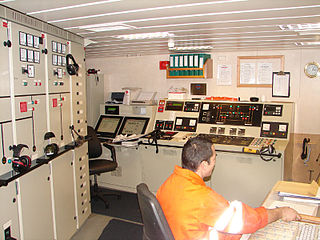
Control engineering or control systems engineering or Automation engineering is an engineering discipline that deals with control systems, applying control theory to design equipment and systems with desired behaviors in control environments. The discipline of controls overlaps and is usually taught along with electrical engineering, chemical engineering and mechanical engineering at many institutions around the world.

A programmable logic controller (PLC) or programmable controller is an industrial computer that has been ruggedized and adapted for the control of manufacturing processes, such as assembly lines, machines, robotic devices, or any activity that requires high reliability, ease of programming, and process fault diagnosis.

A schematic, or schematic diagram, is a designed representation of the elements of a system using abstract, graphic symbols rather than realistic pictures. A schematic usually omits all details that are not relevant to the key information the schematic is intended to convey, and may include oversimplified elements in order to make this essential meaning easier to grasp, as well as additional organization of the information.

Automation describes a wide range of technologies that reduce human intervention in processes, mainly by predetermining decision criteria, subprocess relationships, and related actions, as well as embodying those predeterminations in machines. Automation has been achieved by various means including mechanical, hydraulic, pneumatic, electrical, electronic devices, and computers, usually in combination. Complicated systems, such as modern factories, airplanes, and ships typically use combinations of all of these techniques. The benefit of automation includes labor savings, reducing waste, savings in electricity costs, savings in material costs, and improvements to quality, accuracy, and precision.

An electrician is a tradesperson specializing in electrical wiring of buildings, transmission lines, stationary machines, and related equipment. Electricians may be employed in the installation of new electrical components or the maintenance and repair of existing electrical infrastructure. Electricians may also specialize in wiring ships, airplanes, and other mobile platforms, as well as data and cable lines.
Broadcast engineering or radio engineering is the field of electrical engineering, and now to some extent computer engineering and information technology, which deals with radio and television broadcasting. Audio engineering and RF engineering are also essential parts of broadcast engineering, being their own subsets of electrical engineering.

Rockwell Automation, Inc. is an American provider of industrial automation and digital transformation technologies. Brands include Allen-Bradley, FactoryTalk software and LifecycleIQ Services.

The International Society of Automation (ISA), formerly known as The Instrumentation, Systems, and Automation Society, is a non-profit technical society for engineers, technicians, businesspeople, educators and students, who work, study or are interested in automation and pursuits related to it, such as instrumentation. It was originally known as the Instrument Society of America. The society is more commonly known by its acronym, ISA, and the society's scope now includes many technical and engineering disciplines. ISA is one of the foremost professional organizations in the world for setting standards and educating industry professionals in automation. Instrumentation and automation are some of the key technologies involved in nearly all industrialized manufacturing. Modern industrial manufacturing is a complex interaction of numerous systems. Instrumentation provides regulation for these complex systems using many different measurement and control devices. Automation provides the programmable devices that permit greater flexibility in the operation of these complex manufacturing systems.

Wärtsilä Oyj Abp, trading internationally as Wärtsilä Corporation, is a Finnish company which manufactures and services power sources and other equipment in the marine and energy markets. The core products of Wärtsilä include technologies for the energy sector, including gas, multi-fuel, liquid fuel and biofuel power plants and energy storage systems; and technologies for the marine sector, including cruise ships, ferries, fishing vessels, merchant ships, navy ships, special vessels, tugs, yachts and offshore vessels. Ship design capabilities include ferries, tugs, and vessels for the fishing, merchant, offshore and special segments. Services offerings include online services, underwater services, turbocharger services, and also services for the marine, energy, and oil and gas markets. At the end of December 2023, the company employed 17,800 workers.
Building automation (BAS), also known as building management system (BMS) or building energy management system (BEMS), is the automatic centralized control of a building's HVAC, electrical, lighting, shading, access control, security systems, and other interrelated systems. Some objectives of building automation are improved occupant comfort, efficient operation of building systems, reduction in energy consumption, reduced operating and maintaining costs and increased security.

An engine officer or simply engineer, is a licensed mariner qualified and responsible for operating and maintaining the propulsion plants and support systems for a watercraft and its crew, passengers and cargo. Engineering officers are usually educated and qualified as engineering technicians.
The following outline is provided as an overview of and topical guide to automation:
The U.S. Army Prime Power School is run by the United States Army Corps of Engineers at Fort Leonard Wood, Missouri since January 2011, having previously moved from Fort Belvoir, Virginia. The mission of the school is to produce MOS 12P – Prime Power Production Specialists for the U.S. Army.
Design technology, or D.T., is the study, design, development, application, implementation, support and management of computer and non-computer based technologies for the express purpose of communicating product design intent and constructability. Design technology can be applied to the problems encountered in construction, operation and maintenance of a product.
The German-Malaysian Institute is the German-Malaysian educational institute in Malaysia.
Quanta Technology LLC is a utility infrastructure consulting company based in Raleigh, North Carolina. It is a wholly owned subsidiary of Quanta Services.
An electrical contractor is a business person or firm that performs specialized construction work related to the design, installation, and maintenance of electrical systems. An electrical contractor is different from an electrician; an electrician is an individual tradesman and an electrical contractor is a business person or company that employs electricians. Both usually hold licenses and insurances to properly and safely operate a business, protecting the employees and home owners/business owners from insurance liabilities. These requirements vary from state to state. Electricians may work for an electrical contractor, or directly for individuals or companies.

Project commissioning is the process of ensuring that all systems and components of a building or industrial plant are designed, installed, tested, operated, and maintained according to the owner's or final client's operational requirements. A commissioning process may be applied not only to new projects but also to existing units and systems subject to expansion, renovation or revamping.

Automation technicians repair and maintain the computer-controlled systems and robotic devices used within industrial and commercial facilities to reduce human intervention and maximize efficiency. Their duties require knowledge of electronics, mechanics and computers. Automation technicians perform routine diagnostic checks on automated systems, monitor automated systems, isolate problems and perform repairs. If a problem occurs, the technician needs to be able to troubleshoot the issue and determine if the problem is mechanical, electrical or from the computer systems controlling the process. Once the issue has been diagnosed, the technician must repair or replace any necessary components, such as a sensor or electrical wiring. In addition to troubleshooting, Automation technicians design and service control systems ranging from electromechanical devices and systems to high-speed robotics and programmable logic controllers (PLCs). These types of systems include robotic assembly devices, conveyors, batch mixers, electrical distribution systems, and building automation systems. These machines and systems are often found within industrial and manufacturing plants, such as food processing facilities. Alternate job titles include field technician, bench technician, robotics technician, PLC technician, production support technician and maintenance technician.










